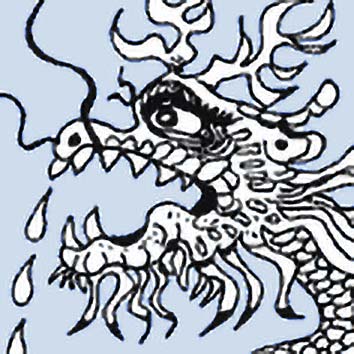
The Taijiquan Classics say:
"The most important thing in a fight is that you win!"Not.What I think is most often missed about the Taijiquan classics, because it isn't explicitly stated, is that they present Taijiquan as a
conduct practice.
The literary roots of these classics are pretty clearly Daoist and Confucian. The style, language and even a few quotes make this clear. The Taiji classics are syncretic, meaning they draw on several sources yet give a feeling of cohesive wholeness.
Both Daoism and Confucianism conceive human beings, or perhaps I should say
humanness, in terms of commitments. It is easy to argue that a person who starts eating human flesh has lost their humanity, but what makes Daoism and Confucianism distinct from "Western culture" is the notion that humanness is a continuum.
In other words, they pose the question, "Just how human are we?" Confucians answer the question by saying there is a protocol one can follow which is based in, and renewed by, an examination of our natural relationships with other people. How well we interact with the people close to us will influence how well each of them interacts with the people they know-- thus creating interlocking chains of good conduct leading all the way from the Emperor to every person in the nation.
Daoists agreed with this assessment, but they said that if a mechanism exists by which we are all connected, than it works on the cosmic level too. Thus our conduct must be connected to animals, stars and earthquakes. Popular Chinese religion often took this idea in to the realm of "wacky." Cults regularly sprung up saying things like, "If we regularly use too much energy getting across town, we will cause the icebergs to melt, the seas to rise and soil to become parched." Oh wait, that was Al Gore--anyway, you get the idea.
Confucians and Daoists both summerized their teachings with lists of precepts. I should add that Daoist precepts often concerned the inner workings of the body itself. While it is often posited that bad digestion must somehow be connected to earthquakes, the connection is
not known, and
keeping in mind that the connection itself is unknown--
is a Daoist precept.Oh yeah, I was supposed to be talking about Taijiquan. Well, if you take almost any saying from the Taijiquan Classics like for instance, "One's form should have no hollows and no projections" it is easy to see that this is a suggestion about how to perfect the efficiency of one's movement. Confucians think that efficient movement rectifies the heart/mind, and thus leads to clarity in one's actions-- which makes it easier to
align what one intends with what one does!If your intention is to resolve a dispute quickly and efficiently, it is entirely possible that the easiest resolution is to just drop your guard and take the hit.
 It's been a busy weekend but I've been reading this interview with Wang Xiangzai that "adz" sent me. It's from the 1940's and really captures Wang's voice like nothing else I've read. He riled people up in a good way. Check it out. If anyone knows the Chinese for "...intuitively perceiving the peristalsis of the whole body," I'd like to know the characters.
It's been a busy weekend but I've been reading this interview with Wang Xiangzai that "adz" sent me. It's from the 1940's and really captures Wang's voice like nothing else I've read. He riled people up in a good way. Check it out. If anyone knows the Chinese for "...intuitively perceiving the peristalsis of the whole body," I'd like to know the characters.
 The reason for discipline is to make a practice irreversible.
The reason for discipline is to make a practice irreversible. For example, the Kitchen God lives over the stove in Chinese homes. He represents an irreversible commitment to keep the house clean. The method is cleaning on a regular schedule. When cleaning becomes "second nature" the method can become more spontaneous, but it can't really be dropped. The fruition is living in a cleaner, simpler, healthier environment, where things are easy to find, easy to store, and easy to get rid of.
For example, the Kitchen God lives over the stove in Chinese homes. He represents an irreversible commitment to keep the house clean. The method is cleaning on a regular schedule. When cleaning becomes "second nature" the method can become more spontaneous, but it can't really be dropped. The fruition is living in a cleaner, simpler, healthier environment, where things are easy to find, easy to store, and easy to get rid of. Most Daoist inspired methods reveal something about your true nature. Often it is an appetite of some kind. The most obvious example is that sitting or standing practices reveal an appetite for stillness. After about two years of discipline your appetite should be strong enough to direct your practice, rigid or militaristic discipline will actually hold you back. I know my morning standing practice is irreversible because if some anomaly or emergency disrupts my practice, the rest of the day I feel myself being pulled toward stillness--At the end of the day I jump into bed and savor the thought of waking up to my practice.
Most Daoist inspired methods reveal something about your true nature. Often it is an appetite of some kind. The most obvious example is that sitting or standing practices reveal an appetite for stillness. After about two years of discipline your appetite should be strong enough to direct your practice, rigid or militaristic discipline will actually hold you back. I know my morning standing practice is irreversible because if some anomaly or emergency disrupts my practice, the rest of the day I feel myself being pulled toward stillness--At the end of the day I jump into bed and savor the thought of waking up to my practice. Today is Yom Kippur.
Today is Yom Kippur.

 Getting enough sleep is one thing. Consistently sleeping until you are not tired is another thing entirely.
Getting enough sleep is one thing. Consistently sleeping until you are not tired is another thing entirely. .
. The Taijiquan Classics say: "The most important thing in a fight is that you win!"
The Taijiquan Classics say: "The most important thing in a fight is that you win!" Here is a concept from Chinese Medicine which has a lot of currency for internal martial artists.
Here is a concept from Chinese Medicine which has a lot of currency for internal martial artists.
